It
is an essential part of the Mission given by God to St Teresa to
teach us how to practise the Prayer of the Heart. In truth she can be
considered to be a major Prophet. Admittedly she is not the first one
in history to do this, but, by an exceptional grace, God wanted her
to leave a legacy greater in breadth and depth that would impact on
the Church at a very critical moment in its history. In fact, when
the Protestant Reformation claimed that each person needs to have a
direct personal relationship with God, the Lord sent this great
Prophet to the Church to show us the orthodox and therefore fuller
way to have it. In every sense she embodies the perfect way to have a
personal relationship with Jesus. She takes her time in her books
(Autobiography, Way of Perfection, Interior Castle)
to explain to us in a very practical, flexible and accessible way how
to practise the Prayer of the Heart, indicating what happens, how we
feel it, and how we can discern it. It will be of great benefit, now,
to explore her precious teaching and learn from her how to practise
the Prayer of the Heart.

St
Teresa learned how to practise the Prayer of the Heart by reading
some well-known authors of her time especially Francisco de Osuna
(1497 – c. 1540), on his Third Spiritual Alphabet. In
particular his explanation of the word 'recollection' was of great
help. It might be useful, here, to recall what we emphasized in
earlier chapters, that she had to be determined to give everything to
Christ, to become totally his, in order to give a solid foundation to
her prayer life so that the Prayer of the Heart would commence
bearing fruit. It is worth remembering that before her conversion,
she practised only intermittently what Francisco de Osuna described
on how to recollect oneself. It is also helpful to reiterate here
that the foundations of the Prayer of the Heart are laid, first, when
there is a call from Christ to follow Him from close proximity,
followed by an inflow of the Grace of the Holy Spirit, the total and
determined gift of oneself, and lastly especially by the
determination to follow Him, unconditionally and selflessly. The
Prayer of the Heart is not a relaxation technique, a form of
entertainment, or a quest of any kind! It does not occur just out of
our pure initiative, it happens in a very precise context, the
context of a relationship that starts with Christ, where we put our
hand into His Hands, in order to walk with Him and follow Him. St
Teresa teaches us that the Prayer of the Heart is a love encounter
with Christ where we are immersed in Him, where He pours into us his
Love, the very essence of the Holy Spirit. We can add without fear of
betraying her teaching (see end of Way of Perfection)
that the Prayer of the Heart is the extension of our most recent
Communion, the 'digestive' process that comes with it! It is a
substantial meal where the human being is fed, mostly in the very
depths of his heart! What is more to the point, however, is that the
effects of this food appear quite rapidly!
What
now has to be considered is when to practise contemplative prayer.
This covers the material aspect of the practice in space
and time. According to St Teresa, we can practise the Prayer of the
Heart in two forms: first, by dedicating to it short moments during
the day, as if to nourish and sustain ourselves during the journey,
and secondly, by choosing to dedicate one or two specific moments
during the day for longer practice. As we know, St Teresa established
the rule that her reformed nuns would practise one entire hour of
Prayer of the Heart in the morning and another hour in the late
afternoon.
The
next consideration encompasses the method to be used. In her
book, the Way of Perfection, in chapters 26, 28 through
to 31, St Teresa offers her best description of 'how to practise the
Prayer of the Heart'. But an important point must first be clarified.
As we underlined in the previous chapters, the grace of God is
offered to us in two different ways: first, through general ordinary
help, and secondly, through personal and direct Grace. The journey of
our heart (our very being) until it is immersed in the furnace of
Christ's Love is then divided into two parts: the first part depends
on us, when St Teresa invites us to activate and use the general help
of the grace of God, but then she tells us that the second part is
simply the free response from God.
God,
it is to be remembered, is at the door of our being, He never
violates our freedom and never forces us to enter into HIm. On the
contrary, Almighty God waits for us to give ourselves to Him. If we
offer ourselves to Him, if we entrust ourselves into his hands, if we
throw ourselves into his very arms, his response will be immediate
and He will possess us and we will be immersed in Him while his Holy
Spirit is poured into us. As we have seen, according to St Teresa the
process entails two 'steps' which she calls 'Prayer of Recollection'
and 'Prayer of Quiet'. The first one is realised when we give
ourselves to Him, thereby expressing our choice to Him, and the
second one, in response to the gift of ourselves to Him, occurs when
He gives himself to us, namely, when we are immersed in Him. In the
Prayer of the Heart both of them are inseparable.
As
will be noted, consequently, when reading St Teresa's writings two
expressions stand out sharply when delineating these parts of the
journey: 'Prayer of Recollection' and 'Prayer of Quiet'. One could be
tempted to think that these are two consecutive stages and ways of
practising the Prayer of the Heart. A beginner for instance, would be
forgiven for thinking one would start with the practice of the
'Prayer of Recollection' and subsequently after a few months or even
one or two years, according to God's will, he or she would then be
moved on by God toward a more supernatural prayer, that is,
'Supernatural Recollection' or in fact right into the 'Prayer of
Quiet'. This vision entailing successive sections is erroneous. The
'Prayer of Recollection' and the 'Prayer of Quiet' are two halves of
one and only one fruit: the complete act of the Prayer of the Heart.
God's
Desire to Give of Himself
It
is a fact, however, that commentators are often misled and are even
induced into thinking that these are successive stages. The reason is
based on a partial understanding of the Supernatural, that is, the
Theology of Grace. Theology is extremely firm that God gives
himself to whom He wants, when He wants and in the way chosen by Him.
However, the freedom of God the Giver of the Grace of God is but part
of the Theology of Grace. The other more significant part that is not
always taken into consideration, is the desire in God himself and his
thirst to give himself to us. Indeed, God has an overwhelming thirst
to give himself to us! The saints tell us, indeed, and from
experience, about this all-consuming desire. Therefore it is
imperative that the two aspects of the unequivocal truth on the
Theology of Grace be joined to understand that if we offer ourselves
to God, He will never delay in coming to possess us and pour his
grace into us. When using the general help of His Grace we clarify
our availability to God, and in turn He does not coldly stand back
watching and waiting, detached and inactive. According to the
knowledge of the saints - St.John of the Cross, St.Therese of
Lisieux to name but a few - this is definitely not the real God. He
is thirsty, He IS Thirst itself, and we are the water that can quench
this great thirst. Therefore if we practise the Prayer of
Recollection (Way of Perfection chapters 26, 28-29), his reply
is immediately offering us the first stages of his supernatural
action, mostly the Prayer of Quiet, where the in-dwelling of God
commences. (Way of perfection, Chapters 30-31).
Theology
of Grace
The
following explanation deals with a delicate matter concerning the
Theology of Grace and its interpretation, but it should be understood
by everyone in order to understand what God really desires of us and
how we are to implement this desire in order to grow steadily in the
Spiritual Life.
When we
say that 'God gives himself 'the way He wants, when He wants to whom
He wants', this sounds very incomplete because it gives the
impression that God, for some unfathomable and mysterious reason, or
simply for the sake of safeguarding his total freedom, acts
strangely, and and has no real desire to communicate with on a
regular basis. It also gives the impression that the Grace of God is
like a delicacy which He is in two minds about imparting to us. This
is definitively not the case. Herein, lies the crux of the matter
from which huge confusion results.
In order
to clarify the matter, let us first of all state that no-one
challenges the freedom of God, no-one interferes in his decisions.
But it must not be forgotten that He died for us and this in itself
reveals the insatiable thirst He has to give himself to us, all of
us, all the time and abundantly. It is impossible to endure what He
did for each one of us, as evinced by his sufferings, Passion, Death,
without his being totally committed to love of us and without being
consumed by his Thirst for us. Otherwise this would seem to
contradict the received belief. Given this, then, wherein lies the
difficulty? Two incorrect assumptions cause this difficulty to arise.
First, the thirst of God is not clearly perceived, nor is his
constancy in wanting to give himself to all of us, all the time and
abundantly. Secondly, there is confusion between the perception
of the Grace of God (which falls into the soul and or the body, being
an extra and optional 'crumb' from the divine table), and the Grace
itself (that is uncreated and communicated to our supra-conscious
spirit, but imperceptible to the conscious soul and body).
A
significant question now presents itself: why does God not give the
'perception of the Grace' with the Grace itself? The answer is
important for it illustrates that the beginner tends to confuse the
perception of it with the uncreated Grace itself and, as a
consequence, will easily idolise the 'perception', and deviate from
Faith, going astray from the True God. It is only faith that leads to
the real Uncreated God.
As
a conclusion, we can say that the truth that 'God gives himself the
way He wants, when He wants to whom He wants' would generally apply
not to the core of the grace – the condition, as we have seen,
being the gift of oneself – but to the perception of the grace of
God. Thus a fairer evaluation would be to say: 'God gives the
perception of his grace in the soul/body the way He wants, when He
wants to whom He wants'.
Theology
of Grace and St Teresa
A
brief aside is indicated here to clarify some points St. Teresa makes
on the Theology of Grace. When St Teresa of Avila reminds us what
theology says concerning the freedom of God to give of himself 'when
He wants, to whom He wants, and in the way He wants', we must be
aware that she is at an early stage of her spiritual life
(Autobiography).
At this early stage she cannot distinguish between first, the core of
the grace poured into the spirit, secondly, the perception of the
grace in the soul and/or the body and lastly a possible particular
effect on the body – tears. When explaining this supernatural
action of God in prayer, Teresa uses the allegory of watering the
garden, where water is the Grace of God, with the human being himself as the garden. However, here, 'water' comprises these three realities and they have become fused together, without Teresa consciously realising it in her mind, namely, receiving the grace in the spirit, second, feeling the grace (soul/body), third, having tears as a more common effect in the body. This may be misleading, hence the explanation given above which comes
from St John of the Cross' teaching. This is a further reason that
seems to reinforce the aforementioned partial understanding of how
the Grace of God works. In addition to what has just been outlined,
therefore, we have to bear in mind the difference between the General
help of the Grace of God
and the Particular help
of the Grace of God, as
seen in previous chapters.
In
conclusion, it must be realised that it is necessary to remember the
crucial fact that the foundation of the Theology of Prayer should be
based on a complete and clear understanding of its vital component –
the Theology of Grace.
The
Nature of Contemplation
Added
to this is the fact that having a correct understanding of all the
above-mentioned concepts would immeasurably aid the proper
understanding of the nature of contemplation. As a previous chapter
illustrates, during the first part of last century, theologians
discussed and argued interminably about the nature of contemplation.
One group stressed the importance of the human element in it, which
makes it something that is acquired by human effort, and the other
group laid great stress on the importance of the supernatural
(infused) aspect of it. As it happens, both are right: both stress
the decisive aspects of contemplation, the human part and the divine
part. Both are vital for its success. It is the story of the meeting
of two beings: God and the human being... The Prayer of the Heart, it
is important to realise, is essentially the story of an expressed
love between them (and to love means to give oneself), and
that it is impossible to take into consideration only one of them and
ignore the other. Both beings have free will, both can give
themselves. The Prayer of the Heart is the mutual gift of each of
them to the other. A similar mutual gifting occurs during Communion:
God gives himself to us, and we give ourselves to Him. Communion
should remain a very important point of reference for us in our
practice of the Prayer of the Heart – we cannot afford to neglect
it.
God,
being in his very nature love, comes out of himself, and stands at
the door of our being and, incredibly, He waits. He does not enter.
He never forces the door. With divine respect and love, Almighty God
knocks and waits. If we are really willing to love Him, if we really
want to give ourselves to Him, then a 'union', a 'meeting', an
'embrace' will result. The meeting of two free beings, in an élan
of mutual love, presupposes the use of two mutual freedoms! Christian
contemplation is this meeting, this sacred kiss, the supernatural
embrace! In no way can it exclude the personal initiative of both
beings! The solution to having a correct orthodox understanding of
the nature of contemplation, consequently, comes through recognising
the two modalities of the action of the Grace of God: the grace that
prepares us to receive God and the Grace itself of receiving Him
within us. Christian contemplation, it must be emphasized enough,
cannot be either acquired or infused, it is both: it consists of two
parts of one unique journey that goes from where our heart initially
beats to the Furnace of Love in Christ.

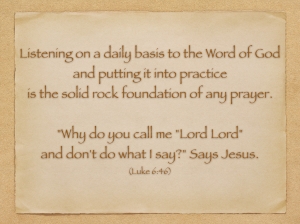




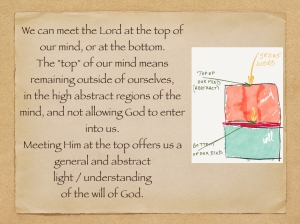
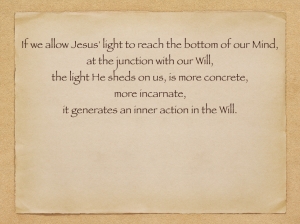
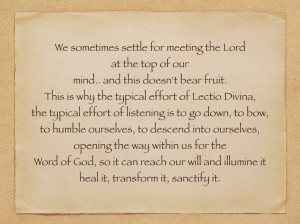
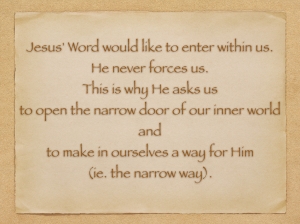

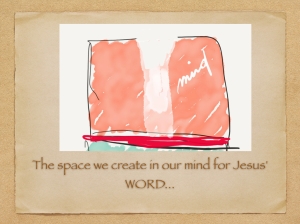
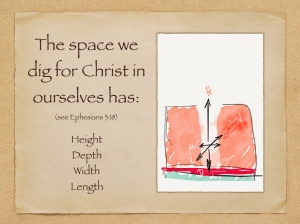

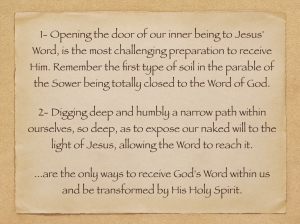
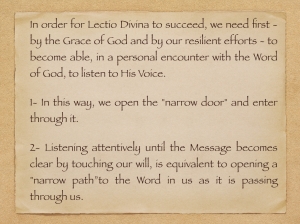
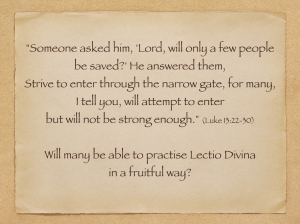
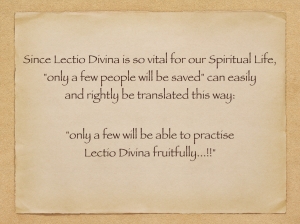


















 Jean is a French Catholic Theologian, specialised in Spiritual Formation, with more than twenty-five years of experience with Consecrated and Lay people. He obtained his Bachelors in Philosophy and his Masters in Spiritual Theology from Toulouse (France), and the Teresianum (Rome). He is presently completing his Ph.D. in Spiritual Theology at the Angelicum (Rome). Jean’s formation was greatly enhanced by the discalced Carmelite Fathers.
He has lectured in Spiritual Theology in different universities with a practical focus. Many articles, studies and books have been published internationally. In 2003, Jean founded the "School of Mary" which offers formation in Spiritual Life, many video courses being available at www.schoolofmary.org . Lectio Divina and Contemplative Prayer are amongst the most important forms of prayer addressed.
Jean gives Spiritual Direction on a regular basis and also gives retreats. He is married, has a daughter and is based in London.
Jean is a French Catholic Theologian, specialised in Spiritual Formation, with more than twenty-five years of experience with Consecrated and Lay people. He obtained his Bachelors in Philosophy and his Masters in Spiritual Theology from Toulouse (France), and the Teresianum (Rome). He is presently completing his Ph.D. in Spiritual Theology at the Angelicum (Rome). Jean’s formation was greatly enhanced by the discalced Carmelite Fathers.
He has lectured in Spiritual Theology in different universities with a practical focus. Many articles, studies and books have been published internationally. In 2003, Jean founded the "School of Mary" which offers formation in Spiritual Life, many video courses being available at www.schoolofmary.org . Lectio Divina and Contemplative Prayer are amongst the most important forms of prayer addressed.
Jean gives Spiritual Direction on a regular basis and also gives retreats. He is married, has a daughter and is based in London.
 Jean is a French Catholic Theologian, specialised in Spiritual Formation, with more than twenty-five years of experience with Consecrated and Lay people. He obtained his Bachelors in Philosophy and his Masters in Spiritual Theology from Toulouse (France), and the Teresianum (Rome). He is presently completing his Ph.D. in Spiritual Theology at the Angelicum (Rome). Jean’s formation was greatly enhanced by the discalced Carmelite Fathers.
He has lectured in Spiritual Theology in different universities with a practical focus. Many articles, studies and books have been published internationally. In 2003, Jean founded the "School of Mary" which offers formation in Spiritual Life, many video courses being available at www.schoolofmary.org . Lectio Divina and Contemplative Prayer are amongst the most important forms of prayer addressed.
Jean gives Spiritual Direction on a regular basis and also gives retreats. He is married, has a daughter and is based in London.
Jean is a French Catholic Theologian, specialised in Spiritual Formation, with more than twenty-five years of experience with Consecrated and Lay people. He obtained his Bachelors in Philosophy and his Masters in Spiritual Theology from Toulouse (France), and the Teresianum (Rome). He is presently completing his Ph.D. in Spiritual Theology at the Angelicum (Rome). Jean’s formation was greatly enhanced by the discalced Carmelite Fathers.
He has lectured in Spiritual Theology in different universities with a practical focus. Many articles, studies and books have been published internationally. In 2003, Jean founded the "School of Mary" which offers formation in Spiritual Life, many video courses being available at www.schoolofmary.org . Lectio Divina and Contemplative Prayer are amongst the most important forms of prayer addressed.
Jean gives Spiritual Direction on a regular basis and also gives retreats. He is married, has a daughter and is based in London.
 Jean is a French Catholic Theologian, specialised in Spiritual Formation, with more than twenty-five years of experience with Consecrated and Lay people. He obtained his Bachelors in Philosophy and his Masters in Spiritual Theology from Toulouse (France), and the Teresianum (Rome). He is presently completing his Ph.D. in Spiritual Theology at the Angelicum (Rome). Jean’s formation was greatly enhanced by the discalced Carmelite Fathers.
He has lectured in Spiritual Theology in different universities with a practical focus. Many articles, studies and books have been published internationally. In 2003, Jean founded the "School of Mary" which offers formation in Spiritual Life, many video courses being available at www.schoolofmary.org . Lectio Divina and Contemplative Prayer are amongst the most important forms of prayer addressed.
Jean gives Spiritual Direction on a regular basis and also gives retreats. He is married, has a daughter and is based in London.
Jean is a French Catholic Theologian, specialised in Spiritual Formation, with more than twenty-five years of experience with Consecrated and Lay people. He obtained his Bachelors in Philosophy and his Masters in Spiritual Theology from Toulouse (France), and the Teresianum (Rome). He is presently completing his Ph.D. in Spiritual Theology at the Angelicum (Rome). Jean’s formation was greatly enhanced by the discalced Carmelite Fathers.
He has lectured in Spiritual Theology in different universities with a practical focus. Many articles, studies and books have been published internationally. In 2003, Jean founded the "School of Mary" which offers formation in Spiritual Life, many video courses being available at www.schoolofmary.org . Lectio Divina and Contemplative Prayer are amongst the most important forms of prayer addressed.
Jean gives Spiritual Direction on a regular basis and also gives retreats. He is married, has a daughter and is based in London.
 Jean is a French Catholic Theologian, specialised in Spiritual Formation, with more than twenty-five years of experience with Consecrated and Lay people. He obtained his Bachelors in Philosophy and his Masters in Spiritual Theology from Toulouse (France), and the Teresianum (Rome). He is presently completing his Ph.D. in Spiritual Theology at the Angelicum (Rome). Jean’s formation was greatly enhanced by the discalced Carmelite Fathers.
He has lectured in Spiritual Theology in different universities with a practical focus. Many articles, studies and books have been published internationally. In 2003, Jean founded the "School of Mary" which offers formation in Spiritual Life, many video courses being available at www.schoolofmary.org . Lectio Divina and Contemplative Prayer are amongst the most important forms of prayer addressed.
Jean gives Spiritual Direction on a regular basis and also gives retreats. He is married, has a daughter and is based in London.
Jean is a French Catholic Theologian, specialised in Spiritual Formation, with more than twenty-five years of experience with Consecrated and Lay people. He obtained his Bachelors in Philosophy and his Masters in Spiritual Theology from Toulouse (France), and the Teresianum (Rome). He is presently completing his Ph.D. in Spiritual Theology at the Angelicum (Rome). Jean’s formation was greatly enhanced by the discalced Carmelite Fathers.
He has lectured in Spiritual Theology in different universities with a practical focus. Many articles, studies and books have been published internationally. In 2003, Jean founded the "School of Mary" which offers formation in Spiritual Life, many video courses being available at www.schoolofmary.org . Lectio Divina and Contemplative Prayer are amongst the most important forms of prayer addressed.
Jean gives Spiritual Direction on a regular basis and also gives retreats. He is married, has a daughter and is based in London.
 Jean is a French Catholic Theologian, specialised in Spiritual Formation, with more than twenty-five years of experience with Consecrated and Lay people. He obtained his Bachelors in Philosophy and his Masters in Spiritual Theology from Toulouse (France), and the Teresianum (Rome). He is presently completing his Ph.D. in Spiritual Theology at the Angelicum (Rome). Jean’s formation was greatly enhanced by the discalced Carmelite Fathers.
He has lectured in Spiritual Theology in different universities with a practical focus. Many articles, studies and books have been published internationally. In 2003, Jean founded the "School of Mary" which offers formation in Spiritual Life, many video courses being available at www.schoolofmary.org . Lectio Divina and Contemplative Prayer are amongst the most important forms of prayer addressed.
Jean gives Spiritual Direction on a regular basis and also gives retreats. He is married, has a daughter and is based in London.
Jean is a French Catholic Theologian, specialised in Spiritual Formation, with more than twenty-five years of experience with Consecrated and Lay people. He obtained his Bachelors in Philosophy and his Masters in Spiritual Theology from Toulouse (France), and the Teresianum (Rome). He is presently completing his Ph.D. in Spiritual Theology at the Angelicum (Rome). Jean’s formation was greatly enhanced by the discalced Carmelite Fathers.
He has lectured in Spiritual Theology in different universities with a practical focus. Many articles, studies and books have been published internationally. In 2003, Jean founded the "School of Mary" which offers formation in Spiritual Life, many video courses being available at www.schoolofmary.org . Lectio Divina and Contemplative Prayer are amongst the most important forms of prayer addressed.
Jean gives Spiritual Direction on a regular basis and also gives retreats. He is married, has a daughter and is based in London.